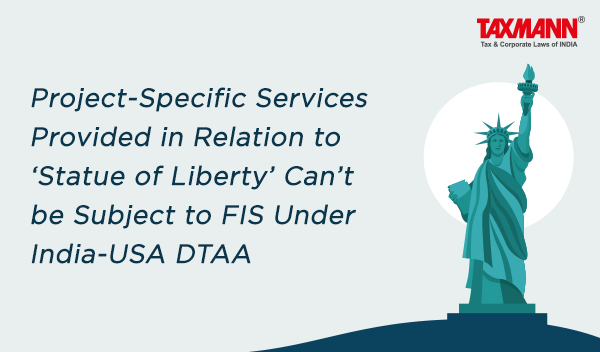Project-Specific Services Provided in Relation to ‘Statue of Liberty’ Can’t be Subject to FIS Under India-USA DTAA
- Blog|News|International Tax|
- 2 Min Read
- By Taxmann
- |
- Last Updated on 25 September, 2023

Case Details: Michael Graves Design Group Inc v. Deputy Commissioner of Income-tax (International Taxation) - [2023] 154 taxmann.com 177 (Delhi-Trib.)
Judiciary and Counsel Details
-
- G.S. Pannu, President & Ms Astha Chandra, Judicial Member
- Niraj Seth, Adv. & Ms Bansi Patel, CA for the Appellant.
- Sanjay Kumar, Sr. DR for the Respondent.
Facts of the Case
The assessee, a tax resident of the USA, was engaged in providing design services for its clients worldwide, including India. During the years under consideration, the assessee provided designs, drawings, layouts etc. to an Indian AOP to construct ‘Statue of Liberty’ under an agreement and received a certain amount of consideration.
The Assessing Officer (AO) held that the assessee had rendered technical and architectural design services which made available the technology, skill, experience, etc. Thus, it fell within the ambit of Fees for Included Services (FIS) under Article 12(4)(b) of the India-USA DTAA.
The Dispute Resolution Panel (DRP) also upheld the order of AO. Aggrieved-assessee filed an instant appeal to the Delhi Tribunal.
ITAT Held
The Tribunal held that the assessee rendered project-specific services to the AOP. The services involved creating a conceptual, aesthetic design and description of scope that would give the EPC contractor and its technical team guidance for the design and execution of the project. The assessee provided only conceptual design services for the appearance of the project. The EPC contractor was responsible for the final design and the technical development thereof. The assessee only presented general conceptual designs and descriptions to help others visualise the project.
The assessee provided consultancy on aesthetic characteristics of the Statue, which involved advising AOP on aesthetic design attributes without regard to technical design. The documents and designs produced by the assessee were only a concept, not a design that could be executed. The EPC contractor designed the building the way it will be constructed, including the aesthetic and the technical design.
Therefore, the AO missed an important fact that while providing architectural services, neither any technical knowledge, skill, experience, know-how etc. was made available to AOP for utilising them in future independently, nor any developed drawing or design have been provided by the assessee which could be applied by the AOP independently. These were only the conceptual design services which were provided for a specific project.
Accordingly, it was held that the consideration received by the assessee for services rendered to the AOP does not fall within the purview of FIS under article 12(4)(b) of the India-USA DTAA.
List of Cases Reviewed
-
- Dy. CIT v. Forum Homes (P.) Ltd. [2022] 132 taxmann.com 223/192 ITD 184 (Mum. – Trib.) (para 14)
- Gera Developments (P.) Ltd. v. Dy. CIT [2016] 72 taxmann.com 238/160 ITD 439 (Pune – Trib.) (para 15) followed.
List of Cases Referred to
-
- Ashok Vardhan Birla v. CWT [1994] 208 ITR 958 (Bom.) (FB) (para 5)
- National Thermal Power Co. Ltd. v. CIT [1998] 97 Taxman 358/229 ITR 383 (SC) (para 5)
- Dy. CIT v. Forum Homes (P.) Ltd. [2022] 132 taxmann.com 223/192 ITD 184 (Mum. – Trib.) (para 8)
- Gera Developments (P.) Ltd. v. Dy. CIT [2016] 72 taxmann.com 238/160 ITD 439 (Pune – Trib.) (para 8).
Disclaimer: The content/information published on the website is only for general information of the user and shall not be construed as legal advice. While the Taxmann has exercised reasonable efforts to ensure the veracity of information/content published, Taxmann shall be under no liability in any manner whatsoever for incorrect information, if any.

Taxmann Publications has a dedicated in-house Research & Editorial Team. This team consists of a team of Chartered Accountants, Company Secretaries, and Lawyers. This team works under the guidance and supervision of editor-in-chief Mr Rakesh Bhargava.
The Research and Editorial Team is responsible for developing reliable and accurate content for the readers. The team follows the six-sigma approach to achieve the benchmark of zero error in its publications and research platforms. The team ensures that the following publication guidelines are thoroughly followed while developing the content:
- The statutory material is obtained only from the authorized and reliable sources
- All the latest developments in the judicial and legislative fields are covered
- Prepare the analytical write-ups on current, controversial, and important issues to help the readers to understand the concept and its implications
- Every content published by Taxmann is complete, accurate and lucid
- All evidence-based statements are supported with proper reference to Section, Circular No., Notification No. or citations
- The golden rules of grammar, style and consistency are thoroughly followed
- Font and size that’s easy to read and remain consistent across all imprint and digital publications are applied



 CA | CS | CMA
CA | CS | CMA
